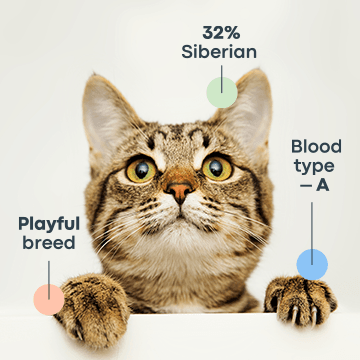It is always a sweet gesture if your pet comforts you whenever you feel bad. Sometimes we wonder if our pets can understand how we feel. Whenever we feel alone, we hope that we can converse with someone without having to feel any biases. But fortunately, pet cats do. If you ever wonder if your cat knows if you are sad, read below to find answers.
How Does This Cat Breed Identifier Work?
Take a photo of the cat you want to identify.
Our advanced AI will analyze and match the image against our extensive database of over 45 cat breeds.
You'll receive the possible breed based on the cat’s appearance.
For precise information on breed, traits and health insights, check our Breed + Health Cat DNA Test.
Cats have the power to sense their owner’s emotions. So, cats have the ability to feel whenever their owner is sad. Beyond sadness, domestic cats are also able to feel whenever their owner has switched moods and emotions. Studies show that cats are conscious of the emotions and sensations of the people with whom they are close or in constant contact.

How can cats sense human emotions?
For animals that live in social groups, the capacity to sense the emotions of others is crucial. Cats engage in social interactions with people (heterospecifics field) as well as other members of their own species (conspecific field).
Some researches show that cats are perceptive to both conspecific and human emotional cues, but it hasn’t been thoroughly explored how these species’ emotions are perceived by cats. It is discovered that to enhance the quality of human-cat and cat-human interactions, and to promote the welfare of cats in the domestic setting, it is essential to comprehend cats’ socio-cognitive capacities to recognize the emotions of their intimate companions. Furthermore, felines have their own specific categories of mental accordance. Unlike humans, cats see humans in their own specific cat way and not how humans see humans. This means, that cats use their own feline point of view which proves that they also have their own mental representation of humans according to their perceptions. These abilities help them to interpret emotional signals that are imposed by their human owners.
But aside from these manners of recognizing human emotions, they are likely to base on the human’s changes in facial expressions and dispositions. This means, that cats have cross-modal interpretations of their owner’s emotions and sadness. Moreover, it is also said that cats get their owner’s normal behaviors and abilities which makes it easy for them to analyze and notice some unfamiliar and unconventional changes and comparisons if their owners act differently.

Your scent?
Though scents are a wide range of information for cats and they do recognize us by scent, it is not a signal for them in the owner’s bad mood situation. Cats observe through their senses but smelling you for understanding your emotions is not the basic way how they can determine this aspect.
Your face?
These animals, when domesticated have skills that are inclined to use their visual and auditory senses in discerning human emotions through behavioral responses to routines. Cats make up their own assumptions of what they see and observe. They base their assumptions on facial expressions but they still find more profound ways where they can empathize.

Your voice?
To relate and connect to their owners’ energies, they have essentially evolved their “social skills”, perhaps as a survival technique. If they hear something unusual, they empathize with it so they can fully understand your emotions according to the feline point of view.
Do our emotions affect cats?
Beyond identifying human emotions, cats are also able to reflect or mirror their emotions to those that they sense and perceive from their social connections - humans or cats alike. More than sensing it, they are also sensitive to the expressions to the extent that they also feel it to themselves. As cats absorb the energies of their closest humans, cats can also feel sad or depressed when they feel so.
These sweet fury dear friends care when you are sad especially when you have established a strong bond and connection. Most likely, they stare in silence and observe what you are doing and how you look. Through these instances, they get information about what they hear and see. Thus, after what they have gathered from their observations, they adjust their feelings and behavior accordingly. This phenomenon makes them understand and get influenced by their owners’ perceived and shown emotions.

Summary
Cats normally attend to normal behaviors and emotions as they are observant and have the capacity to absorb energy. So if cat owners are going through something specific, cats can sense the change.





